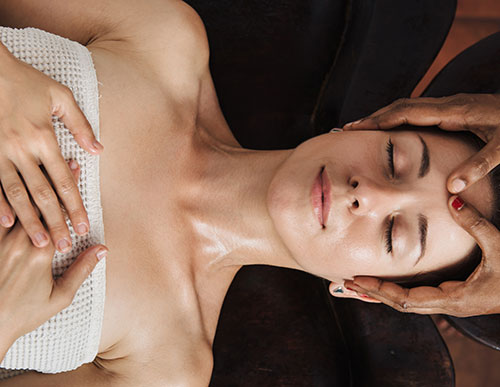Plaque is an insidious substance—a colorless, sticky film—that blankets your teeth and creates an environment in which bacteria erode tooth enamel, cause gum irritation, infection in inner structures such as pulp and the roots, and in extreme cases, tooth loss. Some of the biggest culprits causing
Read more

Overview
Ayurveda is an Indian form of functional medicine dating back almost 5,000 years. Ayurvedic treatment focuses on preventing diseases by balancing a person’s spirit, mind, and body using digestive cleanses, herbal medicine, yoga, massage, and more. Here’s what you should know about Ayurveda and the various forms of Ayurvedic treatment.
What is Ayurveda?
Translating to 'the science of life,' Ayurveda (Ayur is life; Veda is knowledge or science) is the Sanksrit term for an ancient Indian healing system that's been practiced for close to 5,000 years. Ayurveda focuses on the prevention of diseases and its various methods of treatment work to restore the balance between your body—mind and spirit included—and the natural environment.
According to ancient Ayurvedic texts, the universe is made up of five earthly elements—air, fire, water, earth, and ether—which combine uniquely to form three doshas (life forces):
- Vata, made up of air and ether
- Pitta, made up of fire and water
- Kapha, made up of earth and water
These doshas can express themselves physically, emotionally and mentally, and control everything from your emotions and breathing to movement and digestion.
What Are the Benefits of Ayurveda?
Every person exists as a combination of these three doshas, though aspects of one dosha typically tend to dominate. Balancing the doshas leads to the creation of a positive relationship between body, mind, and the universe and can result in:
- Increase in mental wellbeing
- Decrease in stress
- Increase in energy levels
An imbalance in any one of these doshas, however, results in disease.
What Are Some of the Different Ayurvedic Treatments?
Instead of concentrating on healing disease, Ayurvedic practitioners focus on restoring the balance between the three doshas, which in turn will help you recover. An Ayurvedic treatment plan to re-establish harmony within the patient’s body and mind can include:
- changes to diet and nutrition
- digestive and bowel cleanse (panchakarma)
- use of herbal medicines
- massage (abhyanga)
- yoga and breathing techniques
- meditation
What to Expect During Your Ayurvedic Treatment
Determining your doshas is the first step in any Ayurvedic treatment—Chris Strickland will ask a series of thorough questions about all aspects of your life. Expect to discuss in detail your diet, medical history, mental health, current relationships, job, and more. Along with a physical examination, emphasis is also placed on the health of your speech, pulse, tongue, and nails. This allows Ayurvedic practitioners to identify the root cause of disease and prescribe treatments specific to your needs.
For more information about Ayurvedic treatment options contact Chris Strickland at (706) 769-9779.
Resources:
-
What is Tooth Decay?
Category: Tooth Care
-
Wisdom Teeth
Category: Dental Problems
Wisdom teeth are the third and final set of molars that erupt in the back corners of the upper and lower normal adult mouth. Unfortunately, most people experience problems from wisdom teeth; in most cases, this is because the teeth erupt too close to existing permanent teeth, causing crowding, improper
Read more -
Women and Tooth Care
Category: Tooth Care
Women have special needs when it comes to their oral health. That’s because the physical changes they undergo through life—menstruation, pregnancy and childbirth, breast-feeding and menopause—cause many changes in the body, some harmful to teeth and gums. Lesions and ulcers, dry sockets, as
Read more -
X-Rays
Category: Tooth Care
When X-rays pass through your mouth during a dental exam, more X-rays are absorbed by the denser parts (such as teeth and bone) than by soft tissues (such as cheeks and gums) before striking the film. This creates an image on the radiograph. Teeth appear lighter because fewer X-rays penetrate to reach
Read more -
Your Feet at Work
Category: Foot Anatomy
Whether you work in an office, a factory, or any other environment, your feet play a vital role in keeping you productive and comfortable throughout the workday. This article explores the importance of foot health in the workplace and provides tips for maintaining healthy feet while on the job. Understanding
Read more -
Your First Dental Visit
Category: Patient Information
Your first dental visit promises to be a pleasant experience. Making sound decisions about your dental care and oral health is an easy thing to do with the right preparation beforehand: Make a list of questions to ask our office, so you don't forget anything on the day of your appointment. This
Read more -
Your Footprint
Category: Foot Anatomy
Your footprint is more than just a mark left on the ground—it can provide valuable insights into the health and structure of your feet. In this article, we'll explore the different types of footprints, what they can reveal about your feet, and how you can use this information to maintain foot health. Types
Read more -
Your Rights and Responsibilities as a Patient
Category: Patient Information
Patient Rights You have a right to choose your own dentist and schedule an appointment in a timely manner. You have a right to know the education and training of your dentist and the dental care team. You have a right to arrange to see the dentist every time you receive dental treatment, subject to
Read more
Contact Us
Send Us An Email
Our Location
Find us on the map
Hours of Operation
Our Regular Schedule
Monday:
8:00 am-5:00 pm
Tuesday:
8:00 am-5:00 pm
Wednesday:
8:00 am-5:00 pm
Thursday:
8:00 am-5:00 pm
Friday:
Closed
Saturday:
Closed
Sunday:
Closed
